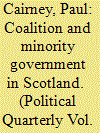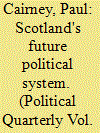|
|
|
Sort Order |
|
|
|
Items / Page
|
|
|
|
|
|
|
| Srl | Item |
| 1 |
ID:
105871


|
|
|
|
|
| Publication |
2011.
|
| Summary/Abstract |
The United Kingdom general election result in 2010 produced a hung or balanced parliament for the first time in over three decades. Since the United Kingdom has limited postwar experience of this outcome, it is natural that commentators have begun to look elsewhere for lessons on the practicalities of minority and coalition government. This article considers the lessons we can learn from the Scottish parliamentary experience since 1999. It outlines two main points of comparison: strength and stability. One might assume that coalition provides more of both than minority government. Indeed, for that reason, it is rare for central or devolved governments in the United Kingdom to operate as minorities through choice. Yet, the Scottish experience shows that the differences between coalition and minority government are not completely straightforward. Much depends on the institutional context and, in many cases, idiosyncratic elements of particular systems. Consequently, one can identify a trade-off in comparative analysis: as the identification of elements specific to one system increases, the ability to draw clear meaningful lessons decreases.
|
|
|
|
|
|
|
|
|
|
|
|
|
|
|
|
| 2 |
ID:
166566


|
|
|
|
|
| Summary/Abstract |
Interdisciplinary energy research is essential. It advances our understanding of potential transitions from high to low carbon energy systems. However, it is easier to propose than deliver. It requires translation into a simpler language, to aid communication, but not at the expense of the conceptual language that drives our understanding of complex energy systems. We combine legal, political science, and policy studies to show how to balance the need to communicate accessibly and recognise legal and policymaking complexity. We begin with a statement so accepted in legal studies that it has become a truism: the law in the books is not the same as the law in action. The allocation of legal competences is only one influence on policymaking in a complex system. We describe three key ways to conceptualise this relationship between law, policy, and energy systems, focusing on the: (1) ‘on paper’ legal separation of powers between different governments, (2) interaction between law and policy in practice, including blurry boundaries between formal responsibility and informal influence, and (3) role of law as one of many contributors to policymaking. We use these approaches to explain the implications of Brexit for UK energy policy.
|
|
|
|
|
|
|
|
|
|
|
|
|
|
|
|
| 3 |
ID:
138878


|
|
|
|
|
| Summary/Abstract |
Debates on Scottish constitutional reform go hand in hand with discussions of political reform. Its reformers use the image of ‘old Westminster’ to describe ‘control freakery’ within government and an adversarial political system. Many thought that the Scottish political system could diverge from the UK, to strengthen the parliamentary system, introduce consensus politics and further Scotland's alleged social and democratic tradition. Yet the experience of devolution suggests that Holyrood and Westminster politics share key features. Both systems are driven by government, making policy in ‘communities’ involving interest groups and governing bodies, with parliaments performing a limited role and public participation limited largely to elections. The Scottish government's style of policy-making is distinctive, but new reforms are in their infancy and their effects have not been examined in depth. In this context, the article identifies Scotland's ability to make and implement policy in a new way, based on its current trajectory rather than the hopes of reformers.
|
|
|
|
|
|
|
|
|
|
|
|
|
|
|
|
| 4 |
ID:
138874


|
|
|
|
|
| Summary/Abstract |
THE SCOTTISH independence referendum was held on 18 September 2014. From a voter turnout of 85 per cent, 55 per cent voted No to the question ‘Should Scotland be an independent country?’ The result provided something for both sides. For one, a 55 per cent
No vote can be portrayed as a decisive outcome that settles the matter for a generation. For the other, a 45 per cent Yes vote provides hope. In the short term, the hope was that the Smith Commission, formed to produce proposals for further devolution, would recommend a eaningful level of constitutional change. In the long term, it may be that the failure to deliver an adequate devolution ‘settlement’ produces enough of an appetite for a second, this time successful, referendum.
|
|
|
|
|
|
|
|
|
|
|
|
|
|
|
|
|
|
|
|
|